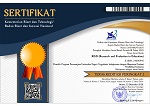Developing a problem-based local history module to improve the critical thinking ability of senior high school students
DOI:
https://doi.org/10.21831/reid.v5i1.13334Keywords:
module development, problem-based local history, critical thinkingAbstract
This research aims at developing a problem-based local history module as learning media to improve the critical thinking ability of Senior High School students. This research employed a research and development (R&D) method referring to ADDIE development design. The procedure of designing ADDIE development included (1) analyzing to identify the learning media needed, (2) designing to organize the material of module corresponding to basic competency and indicator, (3) developing to obtain the finished product of module through validation and limited and large-scale trials, (4) implementing the module during learning process, and (5) evaluating to find out the effectiveness of module. The results of the research show that the problem-based local history module effectively improves the students' critical thinking ability. Through this module, the students are directed to understand a variety of aspects affecting a problem and relating it to the knowledge owned. The problems organized in the module are contemporary and related to the student environment. The process of connecting new knowledge to preexisting knowledge enables the students to develop their own knowledge and to improve their critical thinking ability in solving the problems.
References
Abdullah, T. (1990). Sejarah lokal di Indonesia. Yogyakarta: Gajah Mada University Press.
Aktekin, S. (2010). The place and importance of local history in the secondary history education. Journal of Theory and Practice in Education, 6(1), 86–105.
Aman, A. (2011). Model evaluasi pembelajaran sejarah. Yogyakarta: Ombak.
Amir, M. T. (2015). Inovasi pendidikan melalui problem based learning: Bagaimana pendidik memberdayakan pemelajar di era pendidikan. Jakarta: Kencana.
Anitah, S. (2009). Teknologi pendidikan. Solo: Inti Media Surakarta.
Anitah, S. (2010). Media pembelajaran. Solo: UNS Press.
Arsyad, A. (2010). Media pembelajaran. Jakarta: PT. Raja Grafindo Persada.
Daryanto. (2013). Menyusun modul (Bahan ajar untuk persiapan guru dalam mengajar). Yogyakarta: Gava Media.
Gredler, M. E. (2011). Learning and instruction - Teori dan aplikasi. (Tri Wibowo B. S., Trans.). Jakarta: Kencana Prenada Media Group.
Huda, M. (2014). Model-model pembelajaran dan pengajaran isu-isu metodis dan paradigmatis. Yogyakarta: Pustaka Pelajar.
Humaedi, M. A. (2014). Kegagalan akulturasi budaya dan isu agama dalam konflik Lampung. Analisa, 21(2), 149–162. https://doi.org/10.18784/analisa.v21i02.11
Illeris, K. (2011). Contemporary theories of learning: Teori-teori pembelajaran kontemporer. Bandung: Nusa Media.
Kochhar, S. K. (2008). Pembelajaran sejarah (Teaching of history). Jakarta: PT. Gramedia Widiasarana Indonesia.
Lampung Province's Daily Council - Batch 45. (1995). Sejarah perkembangan pemerintahan di Lampung (Book II). Bandar Lampung: Badan Penggerak Pembina Potens iAngkatan 45.
Lunenburg, F. C. (2011). Critical thinking and constructivism techniques for improving student achievement. National Forum of Teacher Education Journal, 21(3), 1–9.
Masek, A., & Yamin, S. (2011). The effect of problem based learning on critical thinking ability: A theoretical and empirical review. International Review of Social Sciences and Humanities, 2(1), 215–221.
Pribadi, B. A. (2014). Desain dan pengembangan program pelatihan berbasis kompetensi (Implementasi model ADDIE). Jakarta: Prenada Media Group.
Rezaee, A. A., & Azizi, Z. (2012). The role of zone of proximal development in the students' learning of English adverbs. Journal of Language Teaching and Research, 3(1), 51–57. https://doi.org/10.4304/jltr.3.1.51-57
Rosyad, A. (2003). Teori belajar dan pembelajaran. Jakarta: PT. Rineka Cipta.
Sani, A. R. (2015). Pembelajaran saintifik untuk implementasi kurikulum 2013. Jakarta: Bumi Aksara.
Schunk, D. H. (2012). Learning theories: An educational perspective. (E. Hamidah & R. Fajar, Trans.) (6th ed.). Yogyakarta: Pustaka Pelajar.
Slavin, R. E. (2011). Psikologi pendidikan: Teori dan praktik. (M. Samosir, Trans.). Jakarta: Indeks.
Styron, R. A. (2014). Critical thinking and collaboration: A strategy to enhance student learning. Journal of Systemics, Cybernetics and Informatics, 12(7), 25–30. Retrieved from http://www.iiisci.org/journal/sci/FullText.asp?var=&id=EI597JP12
Suarsana, I. M., & Mahayukti, G. A. (2013). Pengembangan e-modul berorientasi pemecahan masalah untuk meningkatkan keterampilan berpikir kritis mahasiswa. Jurnal Pendidikan Indonesia, 2(2), 264–275. Retrieved from https://ejournal.undiksha.ac.id/index.php/JPI/article/view/2171/1887
Supriatna, N. (2011). Konstruksi pembelajaran sejarah yang berorentasi pada masalah kontemporer pembangunan. MIMBAR: Jurnal Sosial Dan Pembangunan, 27(1), 21–30. https://doi.org/10.29313/mimbar.v27i1.308
Suranto. (2015). Teori belajar & pembelajaran kontemporer. Yogyakarta: LaksBang PRESSindo.
Sutimin, L. A., & Wahyuni, S. (2013). Perencanaan pembelajaran sejarah. Yogyakarta: Ombak.
Ward, J. D., & Lee, C. L. (2002). A review of problem-based learning. Journal of Family and Consumer Sciences Education, 20(1), 16–26.
Wasino, W. (2005). Sejarah lokal dan pengajaran sejarah di sekolah. Jurnal Paramita, 15(1).
Downloads
Published
How to Cite
Issue
Section
Citation Check
License
The authors submitting a manuscript to this journal agree that, if accepted for publication, copyright publishing of the submission shall be assigned to REID (Research and Evaluation in Education). However, even though the journal asks for a copyright transfer, the authors retain (or are granted back) significant scholarly rights.
The copyright transfer agreement form can be downloaded here: [REID Copyright Transfer Agreement Form]
The copyright form should be signed originally and sent to the Editorial Office through email to reid.ppsuny@uny.ac.id

REID (Research and Evaluation in Education) by http://journal.uny.ac.id/index.php/reid is licensed under a Creative Commons Attribution-ShareAlike 4.0 International License.







.png)





